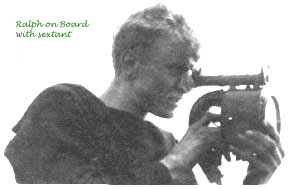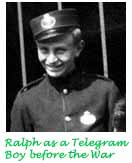

|
|||||
| Ralph Stobart Robson, signalman, life in the British Royal Navy World War Two, sinking of Prince of Wales and the Repulse, Singapore | |||||
|
|||||
|
|||||
|
The Askari rushed along the front of the building and stuck his bayonet into one of the Commodore's arse cheeks. The sentry casually stood by whilst the wounded officer was attended to. The building was in uproar. 'Jolly Jack' was convulsed with laughter. Everyone had rushed to the windows to see the fun. The Commodore wasn't very popular. The English Sergeant was sent for, but he was on leave in Nairobi, non of the native troops could speak English - an impasse. The officer had been taken to hospital, a new sergeant appeared and the Askaris were replaced by British troops. Some time before these events I had been promoted to office tea boy - the Indian tea boy was being replaced as they had decided it wasn't fit for the natives to make tea for the British, so I was elected. I think this was some form of punishment as my attitude towards the officers was somewhat cavalier. However, one job was as good as another and I made no objections. I felt rather sorry for the native bloke whose job I was taking, but he appeared to be quite pleased as he said he had managed to milk the bwanas of much loot. He had bought the cheapest tea dust and didn't always use cow's milk, believing that buffalo milk was just as good. His one real expense was having to purchase white sugar. The tea was made in what had been the girl's outside toilets. These were beautifully appointed with plenty of washbasins upon which planks were laid and tea was brewed. I went down to meet the Indian who ran the operation - he bought the supplies and kept the charges as his wages and as the tea was very cheap everyone was satisfied. He was a jolly looking man and showed me what to do. The stuff he used was tea dust, the cheapest, with buffalo milk. He boiled the water on a smallish oil cooker, owned by the Royal Navy. I used to brew the tea, pour it through a strainer then take into the office and leave it on a table. This was done at regular intervals during the day. Two ratings were detailed to dish it out and I got the receipts. All went as merry as a wedding bell until the arrival of the wrens. They arrived out of the blue from the U. K., accompanied by an officer. She made it plain that they were out of bounds to all but officers and she also took over the tea. She didn't much like the whole operation and I quickly found myself out of a job - however, I was quite pleased with the money I had made. |
|||||
|
|||||
